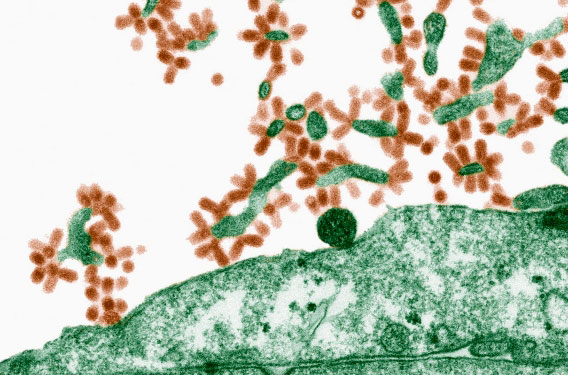Pandemic Responders
Cummings School receives major grant to engage in a global effort to thwart emerging infectious diseases
By Catherine O’Neill Grace
The term “global pandemic” has become a familiar one during outbreaks of infectious diseases such as SARS, avian flu and most recently, H1N1. Now the U.S. Agency for International Development (USAID) is launching a multimillion dollar global effort to combat zoonotic diseases, which first emerge in animals and threaten both animal and human health. Tufts will play a vital role in this public health campaign.

The RESPOND program will unite veterinarians, physicians, public health professionals and others to help prevent and control diseases that may be transmitted between animals and people. Above are influenza viruses (in brown) budding from a host cell (in green). Photo: © Steve Gschmeissner/Science Photo Library/Corbis
The Cummings School of Veterinary Medicine has been tapped by USAID to be part of a multidisciplinary team that will receive a grant of up to $185 million over five years. Their goal is to create better communication and training programs among veterinarians, physicians and public health officials in regions where new diseases are likely to emerge. The RESPOND project, as it is called—one of five in USAID’s new Emerging Pandemic Threats program—will also draw on expertise from faculty at the School of Medicine, the Feinstein International Center and the Tufts Center for the Enhancement of Learning and Teaching.
The project will identify available resources in disease hotspots such as the Congo River basin, Southeast Asia, Amazonia and the Gangetic Plain, which stretches through Pakistan, India, Bangladesh and Nepal. “The Tufts faculty already has existing links with many of the countries involved in the program,” says Robyn Alders, the principal investigator on the USAID grant and an associate professor of international veterinary medicine at the Cummings School.
The Cummings School is no stranger to international efforts to combat disease. In 1983, the school, along with Tufts’ Fletcher School, was tapped by USAID to optimize cattle production in Niger, leading to participation in a long-term effort to eradicate the deadly cattle virus rinderpest. And since 2006, a team of Cummings School veterinarians has been working with the UN Food and Agriculture Organization and the Indonesian Ministry of Agriculture to monitor and control highly pathogenic avian influenza in Indonesia. Using a community-based educational approach, they have provided technical assistance and training for Indonesian veterinarians and the villagers who depend on their small flocks for food and income.
“RESPOND unites veterinarians, physicians and public health professionals and others, such as social and medical anthropologists and ecologists, for the purpose of preventing and controlling diseases that may be transmitted between animals and people,” says Joann M. Lindenmayer, V85, an associate professor of public health at Cummings and co-principal investigator on the USAID grant.
The RESPOND team will begin by developing training programs to investigate and respond to suspect emerging disease outbreaks, in collaboration with in-country partners. Then they will work with local institutions such as schools of medicine, veterinary medicine and public health, ministries of health, agriculture and natural resources/environment and the private sector in the high-risk regions. “Our efforts will be designed to lend a hand through short-term support of partner institutions as they develop the skills and expertise needed to assume responsibility for disease prevention and control efforts within their own countries and regions,” says Lindenmayer.
The five projects in the USAID Emerging Pandemic Threats program will develop strategies to prevent future global pandemics at the earliest possible point of intervention:
• PREDICT: The University of California–Davis School of Veterinary Medicine, the Wildlife Conservation Society, the Wildlife Trust, the Smithsonian Institution and the Global Viral Forecasting Initiative in San Francisco will implement a global early warning system for emerging diseases.
• RESPOND: The Cummings School will work with Development Alternatives in Bethesda, Md.; the University of Minnesota’s Academic Health Center, which unifies all health services including the School of Veterinary Medicine under one administrative roof; Training and Resources Group in Arlington, Va.; and Ecology and Environment Inc. of Chicago to strengthen countries’ capacity to identify and respond quickly to new disease outbreaks.
• IDENTIFY: The World Health Organization, the United Nations Food and Agriculture Organization and the World Organization for Animal Health will support the development of laboratory networks and strengthen diagnostic capacities in areas most likely to be the source of emerging diseases.
• PREVENT: The Academy for Educational Development in Washington, D.C., and the Global Viral Forecasting Initiative will develop a behavioral-change communication program to educate people about high-risk practices that increase the potential for spreading infectious diseases.
• PREPARE: The International Medical Corps will provide technical support for simulations and field tests of national, regional and local plans for dealing with pandemics.
Catherine O’Neill Grace can be reached at catherine.grace@tufts.edu.


